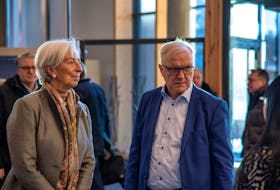At a recent finance industry press conference, one of the guest speakers remarked that one thing universally true of money is that it’s very hard to have too much of it.
And he was right. Making big returns takes a lot of work.
Making small returns by investing in a diversified portfolio on stock markets in North America and internationally, however, is something that just about anyone can do.
There’s no one strategy that covers all investor types, but there are certain tactics anyone taking a do-it-yourself approach to the stock market should employ.
Dr. Erin Oldford, an assistant professor specializing in finance at Memorial University’s faculty of business administration, suggests potential investors should truly understand the companies under consideration – what they’re doing now and what they intend to do.
“You can pull financial statements, they're all available,” says Oldford “You can read how they're describing those statements if you're not an accountant or finance person, you can still get a sense of what their aims are through their annual reports.”
If you end up using one of the countless online discount brokerages, there will already be a wealth of knowledge at your fingertips.
Proper research is of even more importance when diverting capital to emerging markets outside North America, making them less correlated to what happens in the financial ether on this continent.
While Oldford maintains it’s a matter of personal preference; there are benefits to staying closer to home and the Canadian and American dollars.
“But if you're looking to have a well-diversified portfolio, I think there are ample opportunities within the North American market to do so. What's nice is you're not exposing yourself to significant currency exposures.”
For those with a keen interest to diversify into emerging markets, but maintain positions at home, ETFs – exchange-traded funds consisting of multiple types of assets that act much like a traditional index fund – might be just the answer.
“ETFs have really opened opportunities to hold a lot of different assets in one portfolio without having to buy each individual asset, one by one. An ETF can hold 500 different assets within it, but you only have to buy the ETF itself,” Oldford explains.
“We no longer have to diversify on our own, we can buy these ETFs and be diversified immediately.”
The downside to ETFs brings us back to the knowledge component.
Because so much money is being sunk directly into one fund that covers a large number of assets, it means less money being spent on research into those individual assets.
“It’s good for individual investors because costs are lower and we get to be diversified, but it's impacting the markets as a whole because we're not as smart, we don't produce as much research,” Oldford surmises.
One has to wonder then, what impact that might have on a market that even industry experts have indicated is slowing down after a robust 10-year bull market.
“We seem to have a little more volatility in the markets right now,” Oldford confirms. “Stock prices are fluctuating much more than they used to, which is a sign that there's a nervousness in the market.”
That doesn’t mean some people are going to start losing money hand over fist like they did in the wake of the 2008 U.S. housing market crash, they just won’t see the same returns they’ve grown accustomed to.
Moreover, research indicates – and it’s a message Oldford imparts to her students – that staying in the markets is better than waiting on the perimeter.
And should prices continue to decline, it might be a good time for a first-time do-it-yourselfer with some gumption and a willingness to study up, to test the waters.
“It may be that there could be an opportunity, once things have cooled off in the markets, to enter, because that's the best time,” notes Oldford.
Twitter: kennoliver79







